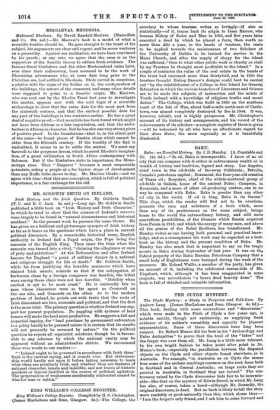MEDIAEVAL RHODESIA.
Mediaeval Rhodesia. By David Randall-Maciver. (Macmillan and Co. 20s. net.)—Mr. Maciver's book is a model of what a scientific treatise should be. He goes straight to the heart of his subject, his arguments are clear and cogent, and he never ventures on a generality. Against our inclination, we have been convinced by his proofs ; at any rate, we agree that the onus is on the supporters of the Semitic theory to adduce fresh evidence. The famous Great Zimbabwe and the other Mashonaland ruins have, ever since their rediscovery, been assumed to be the work of Phoenician adventurers who, at some date long prior to the Christian era, had settled in Rhodesia. Birds carved in soapstone, a platter with the signs of the Zodiac on it, the configuration of the buildings, the nature of the ornament, and many other details were supposed to point to a Semitic origin. Mr.. Maciver, who was sent out by the Rhodes Trust last year to investigate the matter, appears now with the cold logic of a scientific archaeology to show that the ruins date for the most part from the sixteenth century, and that the earliest possible date for any part of the buildings is two centuries earlier. He has a great deal of negative proof,—that no article has been found which might not have been African or a late importation, and that the archi- tecture is African in character. But he has also one very strong piece of positive proof. In the foundations—that is, in the oldest part of the ruins—he found pieces of Nankin china which cannot be older than the fifteenth century. If the locality of the find is undoubted, it seems to us to settle the matter. We must say farewell to the gorgeous dream, which haunted Rhodes's imagina- tion, of a great civilisation in South Africa contemporary with Solomon. But if the Zimbabwe sinks in importance, the Mono- motapa rises. That " Emperor " becomes a most respectable potentate, ruling a people at a far higher stage of development than any Kaffir tribe shows to-day. Mr. Maciver thinks—and we agree with him—that this new conception, which is full of political importance, is a fair exchange for the old.


























































 Previous page
Previous page